Finance is a ruthless, heartless industry, right? The only thing people there care about is money.
Not so fast.
For 25 years, Mark Crowley proved the stereotypes wrong. By leading from the heart with his teams, they routinely ranked in the top 5% at some of the largest financial services companies in America. He's now sharing his secrets as a speaker, and author of the book, Lead from the Heart.
Reading the book, I found it had a great mix of helpful stories, actionable lessons, and good data & research, so we knew we wanted to talk to Mark to learn more.
Today's post comes from our recent interview of Mark Crowley. We wanted to learn more about what it means to lead from the heart, and share how you can apply it to your work as a leader.
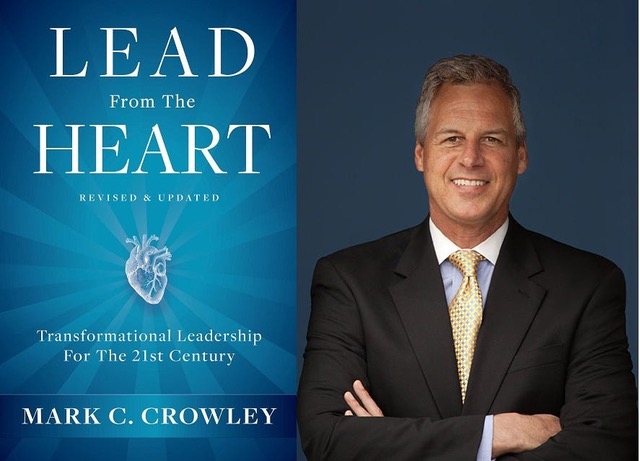
Lessons from Mark Crowley on Leading from the Heart
Mark is a special leader. The stories he shares in this interview and in his book are really inspiring. As just one example from his book, he turned a manager who was totally against him as a leader into not just a fierce advocate, but the one person she asked to have speak at her funeral.
Leading from the heart is powerful stuff, and very approachable; everything he did are things you can do, too.
[Ed note: This post has been edited for length. Everything in italics is from Mark Crowley; regular text is us.]1) What does it mean for someone to lead from the heart?
"It's irrefutable at this point that the traditional ways of managing people are not working. We have the lowest engagement in modern history.
We have more than a half of American who would admit to saying that they effectively hate going to work everyday. This can't be good for people and it is certainly can't be good for business. How much productivity are you getting out of people who feel that way?"
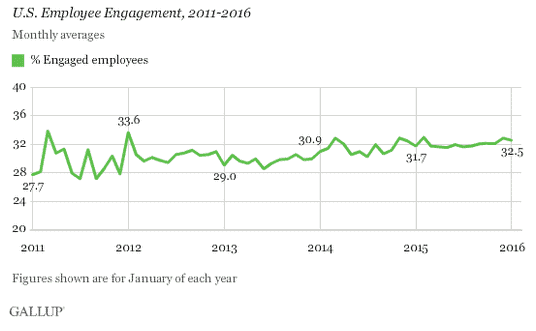
Employee engagement has been dismal for years as Gallup shows.
People need more than money.
"My belief is that what you really want to be doing is to be paying people in what I call, emotional currency.
You have to pay people enough money, there is no question there, but what people really need in order to be engaged is for their emotional needs to be met.
Paying people with the emotional currency has to do with things like:
- Growing them,
- Making them feel that their work matters,
- That they are appreciated by their boss,
- That they are respected in their organization,
- That they are given an opportunity to contribute to something meaningful.
All of that really goes to the hearts in people. Because heart is what drives performance. Heart is what drives engagement.
We need to teach our managers how to actually do those things, and to do them so consistently that people feel really connected to their organizations and wanting to put in the extra effort."
2) How should an individual manager think about leading from the heart?
"If you have 20 people on your team and you only have 8 or 9 that are really performing, what would happen to your team's performance if you could turn them all on?
What would happen to your success as a leader, or to the performance of your region or team, if you have everybody rowing? You'd be surprised what you can achieve then."
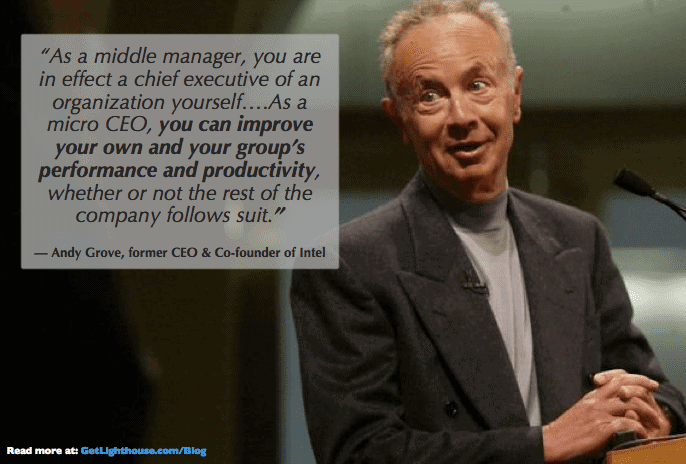
Andy Grove and Mark Crowley both know, any leader can impact their team.
Tap into the joys of managing, and advance your career.
"The other component of this is that it is much more satisfying to know that within your ability as a leader or manager, you can influence somebody so profoundly, that they will want to meet very high expectations, and deliver extraordinary levels of performance.
Also, if you want to progress in your career, ultimately, you're accountable for results. Leading from the heart is a formula for driving performance greater than anything else that you could possibly do. It is not bonuses, it's not any form of financial compensation. [Ed note: Dan Pink's research on the Carrot & Stick reinforces this]
So whatever level of performance you're getting right now, the catalyst for getting it to a higher level is to care about people and support them in the way that you know are going to drive an emotional response."
3) How do you know that leading from the heart works?
"[After accepting a new leadership role] I brought the management team together (4 senior vice presidents), and I said, "What do you do with your top performers?"
And they said, "We do nothing with our top performers. We leave them alone. They're high producing. They don't have time for us. We don't even go see them; we just bring them in for meetings occasionally."
I told them, "That is the dumbest thing I have ever heard in my life."
Support your people.
"Every top performer I ever had, wanted more of my time, more of my attention. They wanted more opportunity to grow and to learn.
I called the VPs out on it. They were like, "Well the way you manage in the bank side isn't going to work with brokers."
I started traveling and met with our top 10 brokers in the country. I went where ever they were: New York, Northern California, Southern California, or where ever.
And so I went and asked them all, "What's one thing that you're not getting that you would love to get?"
And they had a lot to say. Things like, "What are the new products that are coming out? No one has ever taught us how to do it" or "I wanted to broaden my insurance business and I don't know anything about insurance," and "There's certification that we could get"...and on and on and on.
For everyone, it was the same thing: "When are we ever going to grow? When are we ever going to develop?"
Listen and take action.
"I started to work with our clients, and our vendors, and said, let's build some training program, and let's give it to the top performers first. Then, we'll give it to other people as they aspire to it.
Our sales went up. We set records in everything that first year. It was unbelievable."
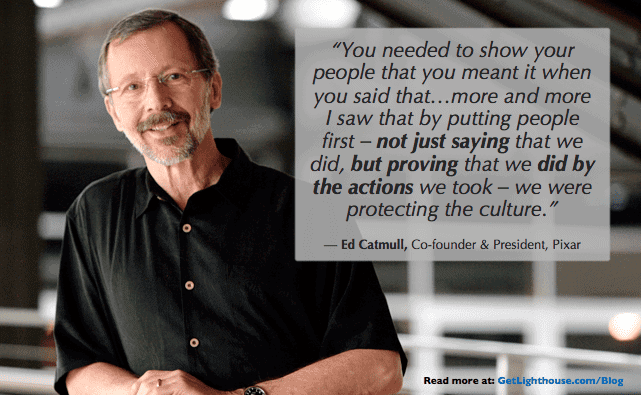
Winning cultures come from taking action to invest in your people.
What Mark learned.
"This proved to me that you think [your top people] just want a lot of money, but they all had different motivations:
- Some wanted to make a difference in their community,
- Some people wanted to leave a legacy,
- Some wanted to help people build for retirement or get their kids through college,
- Some wanted to know their strategy for investing would help people.
They were much more noble than you can imagine, and they needed appreciation and guidance. They needed someone to help them.
It confirmed for me that I could come into a business that I didn't know anything about, with people who had expertise that I will never have, and still influence them in a really, really powerful way.
The idea of leading from the heart is really just about caring about people in a way that supports their most fundamental needs.
We have this need for connection, we have this need to grow, and to feel that what we do every day matters and is appreciated. These aren't wants, these are needs.
We ignore these needs, people wither. But, if you give them to people on a consistent basis, and your intentions are authentic, that's when people thrive. And when people are thriving, they're going to do their best work. That's what I did each stage of my career to drive success and top performance."
4) How does leading from the heart impact companies as a whole?
"There are three examples of company that I would point to:
The Parnassus Workplace Fund
"Jerome Dodson, a Harvard MBA, started this company called Parnassus Investments. He was stimulated to think about opening up a mutual fund that invested in companies that did what I'm talking about, manage people in these ways.
And the stock performance of his mutual funds was absolutely stunning. Over an 8-1/2 year-period the Parnassus Workplace Fund performed 4% above the market consistently. Normally, hedge fund managers are praised if they are 2% above the market.
The reason that he started this was that he had been managing mutual funds for many years, and he told me, "I realized that there was a common denominator of a lot of the companies that were consistently outperforming had this reputation for really caring about their people."
[Ed note: You can read more about Parnassus Investments and their Workplace Fund here.]The Best Places to Work
"Alex Edmans, a professor at the University of Pennsylvania's Wharton school, had done financial analysis on the best companies to work for list by Fortune. From 1984 to 2013, the stock performance of companies making the 100 best companies to work for list outperformed the market by 2 to 3% every year. When you compound that over a 30-year period, that's substantial."
[Ed note: You can read Edman's paper here, and there's a lot more about stock performances for top rated companies to work for in this Glassdoor economist report here.]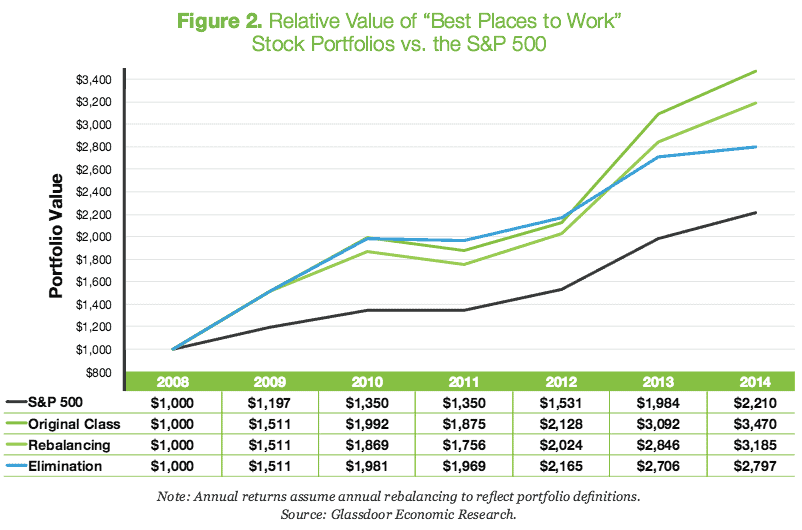
The best companies to work for outperformed the market
Two titans get results: SAS and Google
"If you look at Google, for example, which has been in the Fortune list routinely, their stock performance was up, in the first 10 years, over 1000% since their IPO. I mean, there aren't that many companies ever that have had that kind of performance, nor invest in their people the way they do.
Then at SAS, even with all the money that they have spent, and all the generosity, where they have built pools, gymnasiums, a health clinic, and all those kinds of things for their people, they had 40 years of consecutive revenue growth. It's a privately held company worth an estimated $10.5 billion dollars. The founder is one of the 40 richest people in America.
If you want to boil all this down to one sentence, it would be, we reap what we sow. There's simply no question."
5) What is the easiest way for a manager to apply this to their team starting today?
"I think the most essential management practice is appreciating people. I think it's the one that is the most neglected, too.
Heads will nod and go yes, recognition is important, but if you ask people how often they feel appreciated by their boss, they would say, "Never."
So there is a major gap, and managers think they're doing a great job because they'll see somebody, and they'll go, "Good job, Bill." But that's not what we're talking about.
It's really acknowledging what people did, the accomplishment, and what people did to make it happen. Something like:
- "I saw you come in on a weekend"
- "I know all the nights you stayed late"
- "I saw how much work you put in to make this happen"
- "I know you were behind schedule, you caught up"
Make praise a habit.
"Commit to having a regular meeting with your team, let's say monthly. The very first thing you should do is to acknowledge people for exceeding whatever it was that you asked them to do.
If you have 30 people working for you and 25 of them met or exceeded the goal, you have to recognize all 25.
A lot of times we go, "Well, it's like the Olympics, we're just going to give gold, silver and bronze." If you want to destroy the spirit of the other 17 people that met their goals and your expectations, fail to acknowledge them. You need to take the time and not spend it looking at your watch thinking it's a waste.
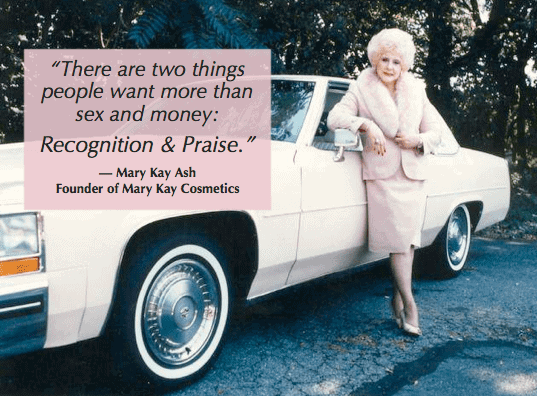
Mary Kay Ash & Mark Crowley both know the power of praise.
Thank and acknowledge people on a systematic basis. People should know that if they meet your expectations and they meet the goals you set for them, that they're going to get acknowledged.
They will really work hard for that. They don't want to come into that meeting and not get the love that you have to give.
So pick a time, and make it a regular meeting. Start by reviewing performance, acknowledging your people publicly. Tell their stories and watch what happens to you and your team's performance. Doing this is the single greatest thing that any manager can do."
---
Why do all this?
Mark Crowley has a great quote at the end of his book that's a key reminder why this all matters so much.
We know there's research to prove leading with heart matters, and you've likely experienced how it makes you feel on occasion in your career. Yet, the most powerful reason may come from how you reflect on your career at a distance as Mark puts it:
"Long after you remember the actual work or the targets you met along the way, what's sustained in your memory is the effect you had on people's lives.
By this one measure above all others, you'll know the true impact you had as a leader."
How are you impacting the people you lead?
---
If you'd like to learn more about Mark Crowley, you can check out his website and blog at www.markccrowley.com and his book Lead from the Heart can be found on Amazon here.





